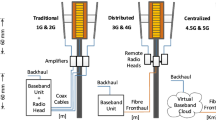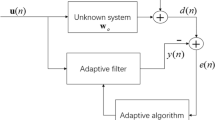Abstract
The linear minimum mean-squared error (LMMSE) channel estimation for orthogonal frequency-division multiplexing (OFDM) systems requires a large number of complex multiplications. We evaluate a simplified LMMSE channel estimation algorithm in a transmit diversity environment by applying a significant weight catching (SWC) technique to the LMMSE fixed weighting matrix. The SWC technique itself is based on modifying the smoothing matrix by leaving the Γ largest values in each row and turning the rest to zeros. This allows the computational complexity of the full LMMSE processor to be reduced by more than 50%. In the well known LMMSE by singular value decomposition (SVD) technique the sparse approximation is accomplished by zeroing out all but the r largest singular values. LMMSE by SVD is the preferred approximation technique for low delay spread channels. However, in channels with large delay spreads, LMMSE by SWC is a better choice in terms of computational complexity and estimation accuracy
Similar content being viewed by others
References
IEEE Std 802.11a/D7.0. Part 11: Wireless LAN Medium Access Control (MAC) and Physical Layer (PHY) Specifications: High-Speed Physical Layer in the 5 GHz Band. New York, USA, 1999.
R. van Nee and R. Prasad, OFDM for Wireless Multimedia Communications, Artech House: USA, 2000.
I. Tolochko and M. Faulkner, “Real Time LMMSE Channel Estimation for Wireless OFDM Systems with Transmitter Diversity,” in Proc. 56th IEEE VTC, pp. 1555–1559, 2002.
O. Edfors, M. Sandell, J.-J. van de Beek, S.K. Wilson, and P.O. Börjesson, “Analysis of DFT-Based Channel Estimators for OFDM,” J. Wireless Pers. Commun, 12(1), pp. 55–70, 2000.
Y.G. Li, N. Seshadri, and S. Ariyavisitakul, “Channel Estimation for OFDM Systems with Transmitter Diversity in Mobile Wireless Channels,” IEEE J. Select. Areas Commun, 17(3), pp. 461–471, 1999.
O. Edfors, M. Sandell, J.-J. van de Beek, S.K. Wilson and P.O. Börjesson, “OFDM Channel Estimation by Singular Value Decomposition,” IEEE Trans. Commun, 46(7), pp. 931–939, 1998.
A.D. Doufexi, S. Armour, M. Butler, A. Nix, D. Bull, J. McGeehan, and P. Karlsson, “A Comparison of the HIPERLAN/2 and IEEE 802.11a Wireless LAN Standards,” IEEE Comm. Mag, 40(5), pp. 172–180, 2002.
I. Tolochko and M. Faulkner, “Channel Estimation in Wireless LANs with Transmitter Diversity,” J. Wireless Pers. Commun, 31(1–2), pp. 63–75, 2004.
J. Medbo and P. Schramm, “Channel Models for HIPERLAN/2 in Different Indoor Scenarios,” ETSI BRAN doc. No. 3ER1085B, 1998.
Author information
Authors and Affiliations
Corresponding author
Additional information
Igor Tolochkoreceived his Dipl.-Eng. Degree in Electrical Engineering from Polytechnic Institute, Riga, Latvia in 1987 and PhD from Victoria University, Melbourne, Australia in 2005. He was a senior and later principal design engineer in mobile communications at the Riga Semiconductor Institute Alpha (1988 – 1993). During 1993 – 1998, he was involved in research and development activities in communications with different companies in Riga and Melbourne, Australia. From 1998 to 2002, he was with Ericsson Australia as a senior design engineer. Currently, he works for NEC Australia Pty. Ltd. as a senior design engineer in 3G Mobile Department. His current research interests include digital signal processing, indoor and outdoor wireless communications and error control coding.
Michael Faulkner(M'84) received the B.Sc. (Eng) from Queen Mary College, London University, UK, in 1970, the M.E. degree from the University of New South Wales, Australia in 1978, and the PhD from University of Technology Sydney in 1993. From 1972 to 1975 he was with STC (now Alcatel) Australia. From 1975 to 1977 he as with the University of New South Wales, and since then as a lecturer and now professor at Victoria University of Technology, Melbourne, Australia where he is director of the Telecommunications and Micro-electronics research centre. Between 1988 and 2000 he spent four periods at Lund University, Sweden. He was co-recipient of the IEE's 1997 IERE prize for a paper on amplifier linearisation. His current interests are, signal processing, radio technology, radio systems and MIMO/OFDM.
Rights and permissions
About this article
Cite this article
Tolochko, I., Faulkner, M. Sparse Approximations of the LMMSE Channel Estimation in OFDM with Transmitter Diversity. Wireless Pers Commun 38, 343–355 (2006). https://doi.org/10.1007/s11277-006-9019-8
Received:
Accepted:
Published:
Issue Date:
DOI: https://doi.org/10.1007/s11277-006-9019-8




